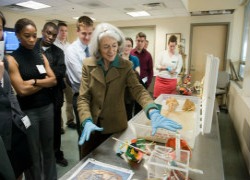Education
 The
teaching mission of the Department of Neurological Sciences is to effectively communicate the current state-of-knowledge in neuroscience, anatomy and physiology to a varied population of learners at the University of Vermont,
the University of Vermont Health Network and to the health sciences community at large. We utilize innovative teaching methods, including independent, active and experiential learning opportunities, in order to foster the development of critical
thinking and problem solving skills. Our goal is to support lifelong learning in the pursuit of, and in the course of, successful careers in biomedical science, scientific research and clinical practice.
The
teaching mission of the Department of Neurological Sciences is to effectively communicate the current state-of-knowledge in neuroscience, anatomy and physiology to a varied population of learners at the University of Vermont,
the University of Vermont Health Network and to the health sciences community at large. We utilize innovative teaching methods, including independent, active and experiential learning opportunities, in order to foster the development of critical
thinking and problem solving skills. Our goal is to support lifelong learning in the pursuit of, and in the course of, successful careers in biomedical science, scientific research and clinical practice.
Residency and Fellowships
The Department of Neurological Sciences offers a fully accredited residency training program that provides a thorough and broad based clinical neurological experience, as well as several fellowship training programs.
Medical Students
The Department is actively involved in medical student education across all four years of the Vermont Integrated Curriculum. At the Foundations level, faculty teach in the Foundations of Clinical Sciences, Neural Science, and Cell and Molecular Biology
courses. During the Clinical Clerkship level, students rotate through a three-week Neurology Clerkship clinical experience with an additional one-week bridge of Neurology-Psychiatry based clinical didactics. Senior selective offerings include
research opportunities, Acting Internship inpatient experience, and subspecialty neurology offerings.
Student Interest Group in Neurology
The Student Interest Group in Neurology, SIGN, is an interest group intended to promote medical student awareness and interest in the clinical neuroscience. This group hosts a series of lectures, career seminars, clinical case reviews on core and
cutting edge topics in the neuroscience field. Contact Elle Levit or Lisa Deuel,
SIGN Faculty Advisors, or Elizabeth McElhinney, SIGN Coordinator, for more information. Learn More
Graduate Students
Department faculty are actively involved in didactic lectures, seminars, journal clubs, laboratory rotations and serve as research mentors for predoctoral trainees in The Neuroscience Graduate Program,
as well as programs in the Graduate Medical Sciences. See COURSE LIST for a full list of courses.
Neuroscience graduate program (NGP) graduate students serve as teaching assistants (TAs) in some of our department courses. We have recognized that TAs need clear objectives and expectations (professionalism and course-related) to best meet their teaching obligations and for them to get the most out of their teaching experiences. To assess how well a TA has met established expectations and objectives, we have also developed a feedback/assessment tool. Please revise/edit these materials to meet your course-specific needs.
Undergraduate Students
Faculty have a significant role in the education of undergraduates, teaching Anatomy and Physiology and Neuroanatomy during the academic year and providing research training opportunities during the academic year as as during the summer. See
COURSE LIST for a full list of courses.
Community Medical School
Designed to share the medical learning experience with our greater community, the Community Medical School is a series of weekly lectures held twice yearly. The topics are chosen for their relevance and presented by College of Medicine faculty experienced
with presenting scientific information in an engaging, easy-to-understand manner. Neurological Science faculty present regularly, visit Community Medical School to learn more.